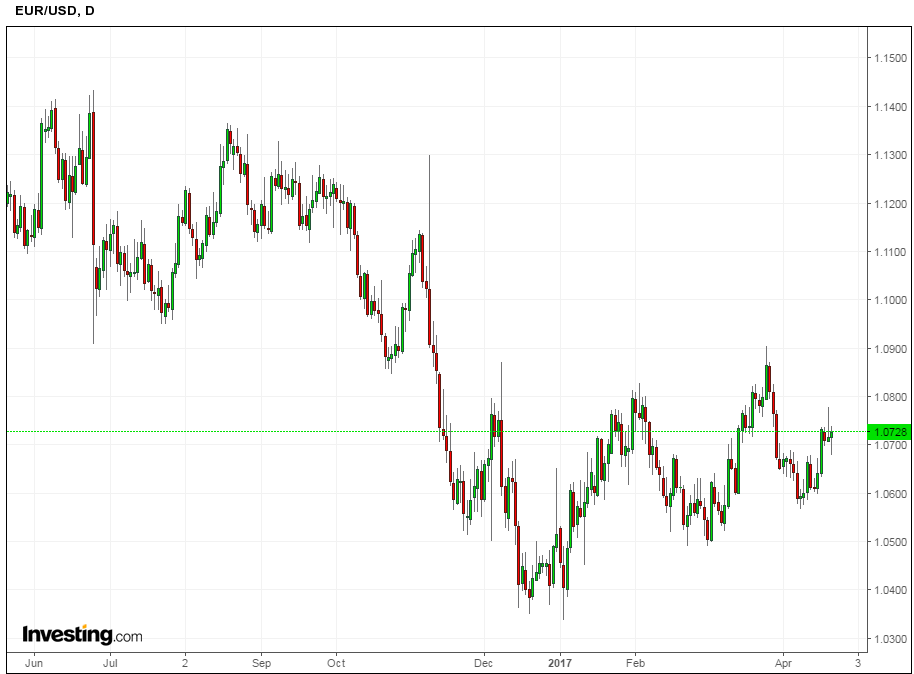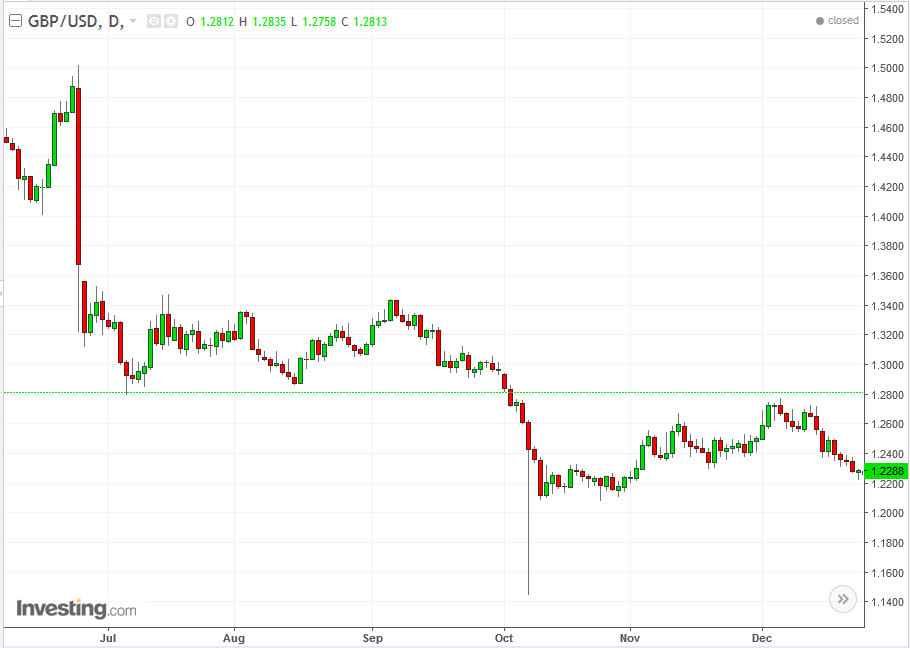by Pinchas Cohen
Brexit, Trump and Now Frexit?
France holds the first round of its presidential election today. Results have the potential to produce a trifecta for last year's swelling global anti-establishment movement. Though there are 11 candidates on the ballot, four appear to be the front-runners.
Former investment banker Emmanuel Macron and mainstream conservative Francois Fillon are the two centrist candidates who are in favor of France remaining in the European Union. Investors view them as the “good guys.”
Far-right Marine Le Pen, who heads the National Front party, and far-left Jean-Luc Melenchon have both suggested they are in favor of leaving the EU. Even if Melenchon won’t insist on a Frexit, he is adamant about aggressive renegotiation with the EU which could, in many ways, potentially just as well become a Frexit. Both candidates terrify investors, since they represent a resumption of the financial disruptions Brexit and Trump brought to markets (minus the US President's stated pro-growth policies).
Le Pen and Macron are expected to win the first round. However, political analysts maintain that it would be a near impossibility for Le Pen to win the second round, which is held when a single candidate doesn't receive 50% of the vote in the first round. Since a decisive victory in the first round generally doesn't happen, the second round—scheduled for May 7—will likely determine who will become France's president. The assumption is that at that time everyone will back the centrist Macron.
Of course, political analysts also said Trump couldn’t win, but the electoral college system—if not the popular vote—put paid to the general consensus for the US outcome.
After Thursday's terrorist attack in Paris, Trump tweeted that it will “probably help” far-right candidate Marine Le Pen, known for her strong anti-immigration, anti-naturalization policies. He may have a point.
Political analysts note that even if she wins, she may not be able to pass controversial legislation, but she would certainly be able to block legislation put forth by others, causing institutional paralysis. Remember that while the UK has an independent currency, the pound sterling, France shares its currency, the euro, with the rest of the eurozone. In other words, the magnitude of the financial disruption this time around is potentially much more devastating than that of Brexit.
The euro advanced last week 1.06%, closing at 1.0728, the highest weekly gain since the week ending at November 4, when it seemed impossible that Trump would win. His victory sent the euro reeling, falling 4.8% versus the dollar over the next two weeks, to a low of 1.0569.
The euro also advanced before the British referendum, when a Brexit, like a Trump presidency, seemed impossible. As the results of the UK referendum became clear, the euro plummeted 4.5% from a high of 1.1428 to a low of 1.0913.

Last week’s biggest advance in almost half-a-year is part of a pattern of the euro’s rise before an important vote, where traders have been optimistic about the outcome. Should they be proven wrong—again—panic could ensue and the euro would be widely expected to decline.
For perspective:
- Brexit and Trump sent the euro falling 4.8% and 4.5% respectively. Should Le Pen or Melenchon win, we might expect the euro to fall at least that much. That would send the euro below 1.03.
- Should the euro reach that low, it would create a downside breakout of a two-year trading range. Its technical implication is a movement that repeats the height of the current pattern, which roughly ranged between the price levels of 1.15 and 1.05, a thousand pips. That makes the target price of 0.95, almost a 9% drop.
- However, the pound crashed 21.15% from the high of 1.5018, before the Brexit vote, to the flash-crash low during Asian trading on October 17, of 1.1841. Might this signal how far the euro may fall in case a European Union country leaves the single currency, or even indicates there's a possibility this could happen, along with the potential financial disruptions that might ensue?
Trump Tells Congress: Shut-up or Shut-down
The US government may shut down on April 29, should Congress not approve a spending bill to fund the government past Friday April 28. President Trump has raised the stakes by insisting on funding for some of his major priorities including the Mexican border wall and the revival of his healthcare legislation.
For a man who seems to be all about looking good, this appears to be particularly critical for him as he nears the symbolic hundredth day of his administration. Clearly symbolism is another priority for the President, so expect this week’s “chicken fight” between the executive and legislative branches to be about the budget.
Will UK Snap Elections Buoy the Pound?
British PM Theresa May announced an early election this past Tuesday. After initially saying she opposed early elections, seeing them as a distraction during the Brexit process, she defended her about-face by pointing to the division within parliament over the Brexit.
The pound responded immediately with a 3% jump, to a high of 1.2905 and a close of 1.2841.
Since Brexit became part of the market narrative, the pound has moved higher every time chances of a hard Brexit diminished; every time the notion of a soft Brexit decreased, and a hard Brexit possibility seemed more likely, the pound has fallen.

Why, then would a snap election move the pound higher? Perhaps, because a new election opens the door for someone else to win, someone who may somehow save the UK from Brexit, or wouldn’t at least be so adamant about a hard Brexit.
Possibly, because May herself may change. Remember, before her nomination (she was never elected) she was a staunch Remainer. Could she have turned from Remainer to a firm Leaver merely to garner support among voters who never voted for her? Might she lead a different kind of campaign, whose victory may allow her to return to her Remain roots?
These are of course unfounded speculations, which investors may or may not be considering. The conventional wisdom is that the pound rose on May asserting herself, and in the process showing that she's a capable, perhaps even canny leader, which dispels doubts for some. Investors are optimistic about the UK and by extension its currency, knowing they can rely on the leadership and strength May is asserting.
Another possibility: maybe the pound’s recent 3% jump is nothing more than a short squeeze. Still, rallies have occurred on the shoulders of short squeezes, so stay tuned.
Equities have been a lot trickier. Since the new world order of anti-establishment sentiment took hold over the past year, equity investors have shown time and again that they are oblivious or indifferent to political risk. It took equity investors three days to overcome their fears of uncertainty after the Brexit vote at the end of June. During that time they traded the FTSE 100 back up and to record highs.
Similarly, but even more rapidly, it took equity investors three hours to do the same for US markets, after the US presidential election in early November. Perhaps even more startling—it took equity traders three minutes to keep buying equities after the Italian referendum in early December, which, for all intents and purposes, was a vote against the EU.
The FTSE in particular has outperformed its European counterparts because any economic havoc has yet to rear its ugly head and stocks were considered cheap after the pound sterling’s devaluation. Remember, while classic economics dictate that a devalued currency increases exports, economic experts asserted that wouldn’t apply here, since uncertainty about the EU’s future would dampen demand. No demand, no exports. Still, exports did increase and the FTSE 100 did make record highs.
Brexit was the most severe financial disruption since the 2008 financial crisis; experts across the board were certain equity markets would crash. Economists and money managers swore that the equity markets would crash should Trump win the US election. In both cases the aforementioned indices made new highs, based on promises.
The bravado displayed by equity investors has so far allowed for no real analysis, just animal spirits. The currency market, on the other hand, is expected to be much more predictable.
'Tis The (Earnings) Season To Be Merry
The Dow pared almost a third of its previous week’s losses, closing at 20547.76. The S&P 500 did better, paring more than half of last week’s 1.2% losses – after the sharpest daily advance on Friday since February 17, up 0.9%, closing at 2348.69. However, the NASDAQ Composite recorded a new closing high of 5915.777 on Thursday, and closed the week at 5910.521, a few points below its highest close on a weekly basis of 5911.735, during the last week of March.
IBM (NYSE:IBM), the fourth most expensive stock on the Dow, kicked the index 50 points lower, as it reported its twentieth straight quarterly decline on a year-over-year basis.The stock closed almost 5 percent lower to $161.69.
Facebook (NASDAQ:FB) shares advanced 2.11 percent, hitting a record high close for the stock, at 143.80 on Thursday, after the social media stalwart announced a new camera-based platform for augmented reality.
Rising interest rates helped boost shares of financial services companies Visa (NYSE:V) and American Express (NYSE:AXP) which both also rose on profitability. Bank of America (NYSE:BAC), the second-largest US bank, saw its income soar 40% to $4.9 billion
However, lending growth is showing signs of lethargy, which would offset the benefits of higher interest rates going forward.
Finally, financial players are still waiting for the real prize from the US administration, the timing and magnitude of possible easing on regulations – which may reshuffle the cards for the whole industry. Should Trump finally manage to get this bill through, financial services companies will make money, irrespective of loan growth, simply by enjoying higher profit margins once costly regulation is gone.
Bonds
While currency activity suggests that FX traders seek greater protection than they did for the pound before the Brexit vote, bonds, including French bonds, have been churning, reflecting traders’ lack of direction. The yield on the US 10-year Treasury note remained at 2.23 percent, the same as the previous week’s close. French 10-year yields closed at 0.93 percent, virtually unchanged.
Commodities
In another blow to OPEC-led supply cuts from rising US production, West Texas Intermediate fell by close to 7%, to settle at $49.62. While crude did fall below the psychological $50 level of support, it stayed clear of the 200-day moving average, which has been a staunch price supporter since August (which was confirmed on November and March).
Iron ore closed Friday at 509, a 1.5 percent advance (pretty much equivalent to the weekly advance), and in so doing crossed over its downtrend line, in place since mid-March.
Gold, the quintessential safe haven, declined on a weekly basis by a negligible .10 percent, to close at $1284.44. This insignificant change reflects the same ambivalence of the bond market to the French election.
Key Economic Data This Coming Week
Housing data – including new and pending home sales – will be reported on Tuesday and Thursday respectively. GDP for the first quarter of 2017 will be reported on Friday.
